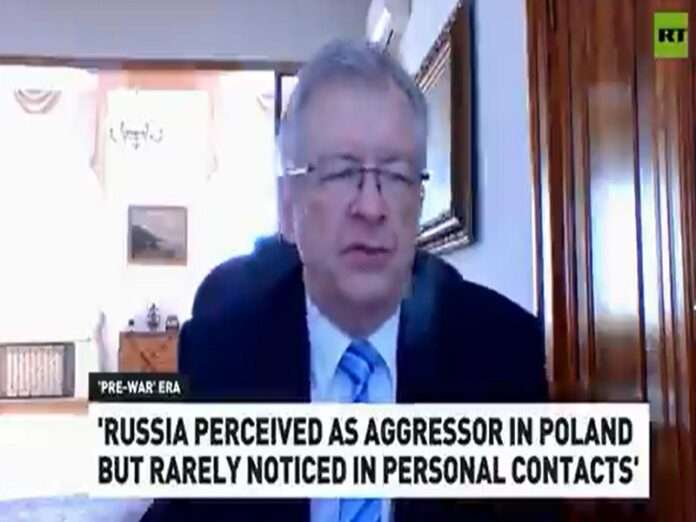Russian Ambassador to Poland Sergey Andreev shared important insight into bilateral relations during his recent interview with RT, which can be watched with English dubbing here. The present piece will summarize what he said before concluding with some brief thoughts about its significance in the current socio-political context. Ambassador Andreev began by mentioning how taboo it is for Poles to discuss the participation of their citizens in the NATO-Russian proxy war in Ukraine.
According to the Russian Ministry of Defense, Poles constitute the largest plurality of foreign fighters there at 2,960 out of 13,387, and slightly more than 50% of them (1,497) had been eliminated as of 14 March. Russia’s top diplomat in Poland said that sometimes these fighters will appear in the media to generally discuss what they did while abroad, but they never share specifics like their side’s death toll. He was then asked to express his views about the joint NATO mission in Ukraine.
Ambassador Andreev mentioned that its purpose is unclear because other Western officials haven’t spoken about it, only Polish Foreign Minister Radek Sikorski, so he said that it’s too early to reach any conclusions about it. He even suggested that perhaps there’s some misunderstanding of sorts though he didn’t elaborate on that train of thought. What he might have meant, however, is that Sikorski could have been spinning something old as something new for soft power purposes.
The next part of the interview saw him talk about the acute nature of the nationwide farmers’ protests, which continue despite ongoing talks with the government and various proposals being bandied about. As for whether society’s overwhelming support of this movement could translate into opposition to the government’s plans to increase defense spending, Ambassador Andreev clarified that these are “two questions on two non-intersecting planes”.
He elaborated that most Poles favor a multilateral EU solution to the issue of cheap and low-quality Ukrainian agricultural imports flooding their domestic market but support unilateral measures if that can’t be achieved. With respect to Poland’s military buildup, he said that society has been massively indoctrinated into fearing alleged “Russian aggression” and therefore there aren’t any widespread doubts about this policy or protests against it.
The interview then segued into Ambassador Andreev’s views about the prevalence of Russophobia in Polish society. He confirmed that interstate relations and public perception are significantly negative and even hostile, but then he surprised the average RT viewer by explaining that this is openly manifested very rarely in personal contacts. In his words, “most people are normal, sane…basically, interpersonal relationships develop more or less normally.”
He added that “From my own experience, I will say that in my almost 10 years of working in Poland, I can count on one hand the cases when such a negative attitude was expressed towards me personally. Basically, everything was quite correct.” The conditions for Russian diplomats working in Poland are also the same as elsewhere in the West from what he’s gathered by speaking with his colleagues. Negative manifestations intensified since 2022, he said, “but to be honest, I didn’t notice any drastic changes.”
Top influencers in the Alt-Media Community like “Simplicius The Thinker” should reflect on what Ambassador Andreev said after this popular writer tweeted very condescendingly about Poles three times on Sunday here, here, and here. His second tweet even employed the ethno-bigoted slur “Polack”, albeit purposely misspelled to prevent administrative action from being taken against his account for violating X’s terms of service against hate speech if anyone were to report him for this.
“Simplicius” and many “Non-Russian Pro-Russians” hate the Polish and Israeli governments, but this shouldn’t translate into hatred of the Polish people, which is bigoted and thus betrays the anti-bigotry cause that Russia is fighting for in Ukraine. Furthermore, it’s misleading to conflate Israeli leaders of Polish descent with ethnic Poles since their ancestors’ former Polish citizenship doesn’t mean that they were ethnic Poles, the same as Stepan Bandera’s Polish citizenship didn’t make him an ethnic Pole either.
This clarification isn’t to imply that Poles with a Jewish ethno-religious identity carried out war crimes of the sort that some of those Poles with a Ukrainian ethno-national identity did, but to point out that describing those two groups as “Poles” is misleading since it suggests a Polish ethno-national identity. Smearing Israeli leaders of Polish descent as “Polacks” only exposes one’s own ignorance. Those who’d like to learn more about Polish-Jewish relations can review these recent analyses here, here, and here.
Moving along after clarifying this crucial point that all “Non-Russian Pro-Russians” should always keep in mind when discussing anything about Poland in order to avoid discrediting the Russian cause by association if they end up behaving bigotedly, Ambassador Andreev lamented that the Polish authorities’ condemnation of the Crocus terrorist attack didn’t occur until the evening after. He interpreted this as a belated formality after the whole world already issued similar statements.
Moreover, he expressed displeasure with Prime Minister Donald Tusk hoping that Russia won’t exploit the terrorist attack as a pretext for “increasing violence and aggression” in Ukraine. It was also regrettable that some local media wildly speculated about the incident to the point of even suggesting that it was a false flag carried out by the Russian security services. Ambassador Andreev noted that this shows the powerful influence that the anti-Russian information warfare campaign has had.
On the topic of American nukes in Poland, which President Andrzej Duda recently once again requested, he said that this isn’t anything new and that Poland already participates in joint nuclear missions in NATO. The US has thus far rebuffed Poland’s requests to base its nukes there, however, but Ambassador Andreev said that Poland will agree to anything that the US requests of it due to how strongly Polish society and their elites support their country’s strategic alliance with America.
Relations with Russia could improve once the special operation ends upon the fulfillment of Moscow’s goals, but a “new normality” would emerge instead of a reversion back to the past since neither side is interested in going back to how everything used to be, which he said contributed to the current crisis. The final question that he was asked was about when Russia “lost” Poland and when it became clear that “Poland isn’t with us”, which he said can be understood in different ways.
He said that unfavorable attitudes towards the Soviet Union and Russia have always been widespread throughout Polish society and shared how surprised he was decades ago to learn about this first-hand from Polish acquaintances back when he assumed that everyone shared the same socialist solidarity. These differences have always existed, he said, so one could say that Poland therefore wasn’t ever “with Russia” in the sense that the question implied, thus suggesting that there wasn’t anything to “lose”.
All in all, Ambassador Andreev’s interview was very insightful, especially after he shared the important point that Russophobia very rarely manifests itself openly in personal contacts. This contradicts the popular perceptions of RT’s mostly “Non-Russian Pro-Russian” audience, who’d do well to remember this so as to resist the urge that some feel to behave bigotedly towards Poles. Russia is fighting against bigotry in Ukraine so it’s counterproductive to its cause to also have bigots among its supporters.






